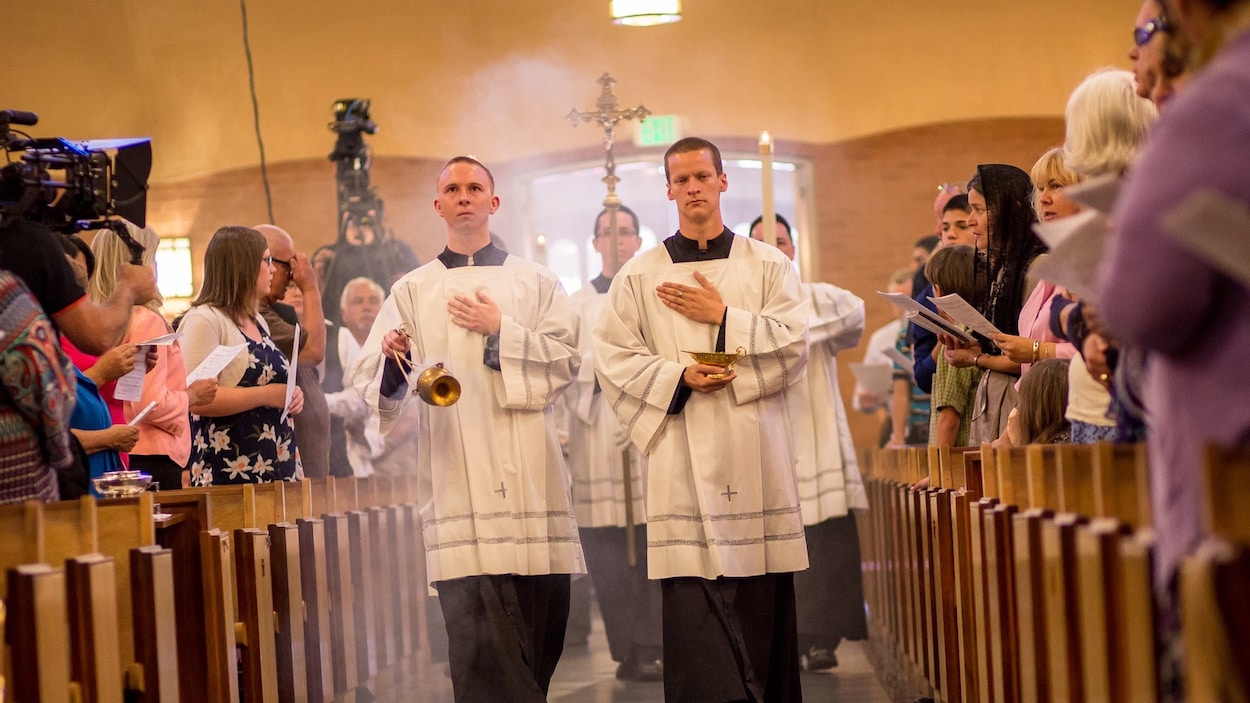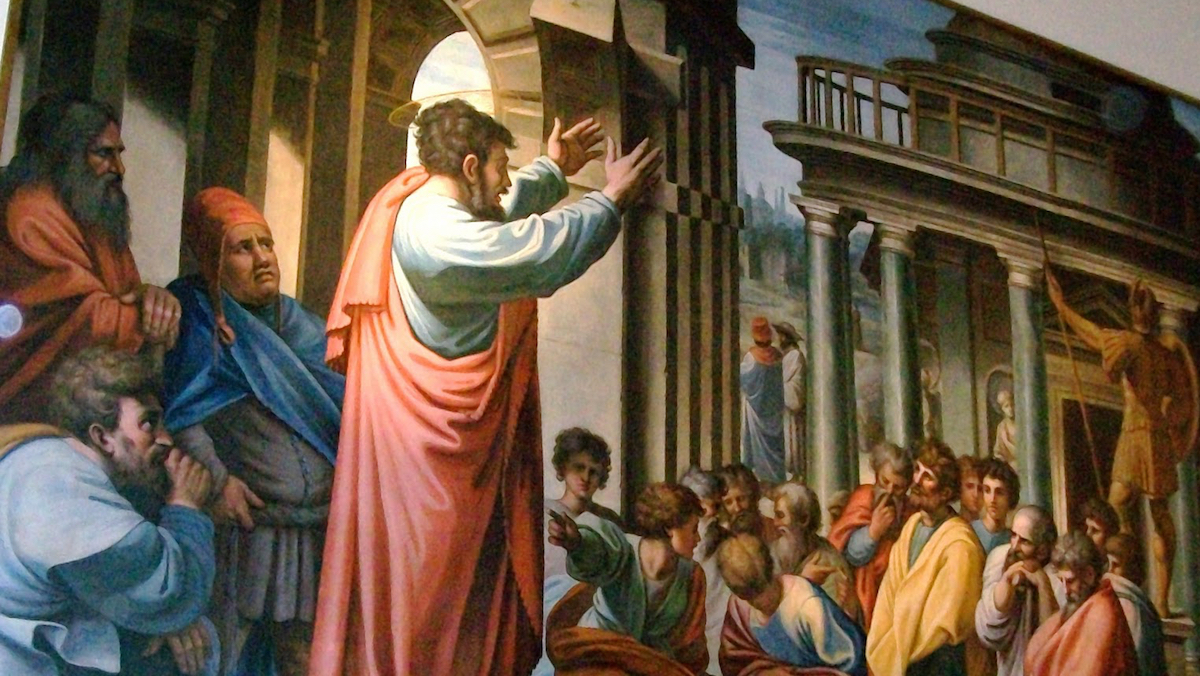The readings for the 30th Sunday in Ordinary Time (Ex 22:20-26; 1 Thes 1:5-10; Mt 22:34-40) should be considered a plea to God to open our eyes of faith to be able to see his presence, to become more aware of it and to live in it fully, trustingly. Frankly, whenever I dwell on God’s presence and on how it should affect my life, I feel terribly embarrassed and humbled as I realize how closed my eyes of faith actually are. Hence, let me try to keep you from a similar humbling experience.
The starting point for our consideration of God’s presence could be its all-encompassing nature. This should be obvious given God’s infiniteness; but it isn’t necessarily so, because we are born in time and space and we can only reason and function within these confinements.
In reality, God is not “more present,” say, in the Tabernacle than in a baseball field, in a church more than in a kitchen. This is so even if it seems to us that he must be “more present” in sacred places and circumstances determined by our faith vis-à-vis anywhere else. Therefore, from our standpoint, what is significant and attitude-altering for us must be God’s presence in relation to us as chosen/anointed individuals and as a Community of faith.
Already a little familiarity with the Old Testament should have made us aware of God’s closeness to those who need him the most: the widows, the orphans, the alien, the outcast, the defenseless, and so on. However, the New Testament, if ever possible, should have made such awareness even more directly challenging. Jesus, i.e. God made flesh like ours, forces us to open our eyes to see him hidden in every brother and sister of ours, in a special and particular way, in those who happen to be the least important: those who are hungry, thirsty, naked, stranger, ill or imprisoned.
This eye-opening statement is found in the well-known passage from the Gospel of Matthew (25:35-45) and represents for us a most disturbing challenge that leaves us shamefaced whenever we dare to be honest with ourselves and acknowledge the undeniable weakness of our faith. This must be the reason why Jesus gives that “unexpected” answer to the scholar of the law (cf. Matthew 22: 37-39). He intentionally points out that there is a second commandment, which is LIKE the first one.
Actually, we should be cognizant that the First Commandment, the one of loving God with all our heart, soul, mind, can leave room for deadly self-delusion; thus God inspired his sacred writers to clarify things for us so as to avoid any dreadful surprises on Judgment Day.
Here is that possible, most dreadful surprise:
Then those on his left will ask and say, ‘Lord, when did we see you hungry or thirsty or a stranger or naked or ill or in prison, and not minister to your needs?’ He will answer them, ‘Amen, I say to you, what you did not do for one of these least ones, you did not do for me.’ And these will go off to eternal punishment, but the righteous to eternal life.” (cf. Matthew 25:44-46)
These least ones must include also science’s latest discovery and interest: those who are at the very beginning of human life (human embryos and pre-born children).
Let us consider the following passages that can help us become convinced of this real presence of God that is easily ignored:
- If anyone says, “I love God,” but hates (= ignores, is indifferent towards, doesn’t care for) his brother, he is a liar; for whoever does not love a brother whom he has seen cannot love God whom he has not seen. (cf. 1 John 4:20)
- Everyone who hates his brother is a murderer, and you know that no murderer has eternal life remaining in him. (cf. 1 John 3:15)
- For the whole law is fulfilled in one statement, namely, “You shall love your neighbor as yourself.” (cf. Galatians 5:14)
- I give you a new commandment: love one another as I have loved you. (cf. John 13: 34)
There are other presences of God that we must consider and live by; some of them are rather challenging, some are comforting and reassuring.
Apart from Jesus being present in our brothers and sisters, especially in the least among them, his presence as Word of God is the most demanding because, as soon as we open our minds and hearts to that Word, our entire life is turned upside down, inside out and recreated or, at least, purified, rectified, enlightened, transformed.
Another rather testing presence is the one of Jesus in the presiding priest at Eucharistic celebrations. Whether we like or dislike a certain priest, whether we agree with him or not, Jesus is using his voice to convey to us, individually and as a Community, his teachings, his warnings, his invitations to perform certain actions together; and Jesus uses him to transform bread and wine into his Body and Blood.
Among the most comforting and reaffirming ways for God to be present to us is whenever two or three, (or more of course), gather in his name and agree to ask the Father for something in his name and, most importantly, his presence under the incredibly humble species of bread and wine in the Blessed Sacrament.
Speaking of which, it is distressing to see that some (a single one would be one too many) approach the altar to receive him in Holy Communion without bowing to reverence and acknowledge his presence, as prescribed. A few give the impression that they have lined up to receive a cheap, meaningless wafer since they appear as moved and as excited as people lined up for their flu shot.
One final consideration: On this side of the grave, our best experience of heaven within the confinements of time and space should be whenever we interact with each other after Mass in the social hall or elsewhere. At that time, for a little while, we are all living tabernacles carrying inside us the Blessed Sacrament. We are the Body of Christ for two reasons: as a Community, as Church; and we are the Body of Christ because we have become what we have just eaten.
I hope that these brief remarks on the various presences of God in us and around us will help us open our eyes of faith so that we may capitalize on God’s closeness to us and in us. May he help us increase our awareness of this incredible reality and, through it, we may have our lives transformed and most generously blessed.








